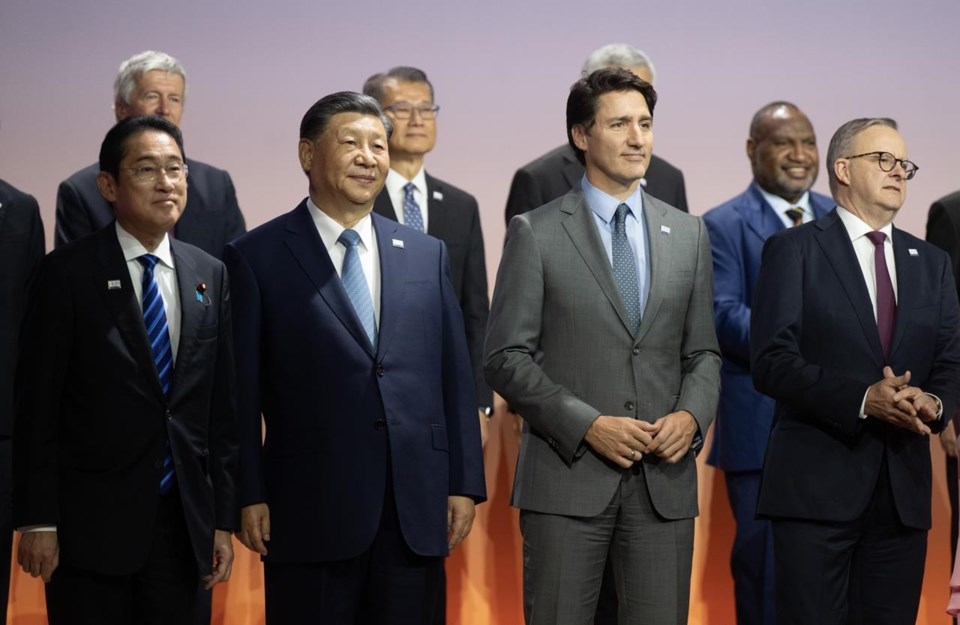SAN FRANCISCO — saąúĽĘ´«Ă˝ and China need to keep in touch, Prime Minister Justin Trudeau said he told Xi Jinping during a chance encounter this week at the annual economic summit of Pacific Rim leaders that wrapped up Friday in northern California.
Xi's four-hour meeting Wednesday with U.S. President Joe Biden was the highlight of an Asia-Pacific Economic Cooperation summit that was all about building an economic bulwark against China's growing influence.Â
Trudeau's run-in was, by all accounts, purely perfunctory — they happened to be side-by-side during Thursday's traditional family photo — but he took a shot at some summit-sideline diplomacy of his own.Â
"I talked about how we need to keep our officials and teams working together to try and create constructive dialogue around issues that matter to us individually but also matter to the world," Trudeau said.Â
"This is part of the ongoing engagement that saąúĽĘ´«Ă˝ needs to have around the world, including with countries we disagree with."Â
So, what did Xi say? "He acknowledged what I said," the prime minister said.
It was a fitting bookend to a summit that seemed dominated from the beginning by the presence of the Chinese president, who apparently left his heart in San Francisco during his first visit to the U.S. in 1985.Â
Xi struck a largely conciliatory tone all week, acknowledging U.S. concerns with the flow of illegal fentanyl from China and the geopolitical importance of his military having open lines of communication with the Pentagon.Â
"The world needs China and the U.S. to work together for a better future," Xi told a dinner earlier in the week hosted by Asia-Pacific business leaders.Â
"China is ready to be a partner and friend of the U.S."
It's far too early to say whether that same sentiment will eventually apply to saąúĽĘ´«Ă˝, Trudeau suggested during Friday's closing news conference, describing the tone of the U.S.-China meeting as a "good sign."
"One of the things about APEC is it is an extraordinarily diverse group of countries that share a common ocean. And because of that, having these frank and direct conversations about how and where we can work together is really important," he said.
"saąúĽĘ´«Ă˝ will continue to engage at various levels with China as we try to move forward in a more positive direction, but stay very strongly anchored in our principles and values."Â
Things went dramatically off the rails in late 2018 when saąúĽĘ´«Ă˝ detained Meng Wanzhou, Huawei's chief financial officer and the daughter of the tech giant's founder, at the behest of U.S. authorities.Â
Two Canadian citizens, Michael Spavor and Michael Kovrig, were promptly detained in China in what was widely seen as retribution, and not released until more than 1,000 days later — the very day Meng was finally freed.Â
China also imposed multi-year bans on its imports of Canadian beef and canola, citing dubious and unproven concerns about pests.Â
And a year after the Canadian government named China as a disruptive global force and declared Beijing responsible for attempts at foreign interference, the Chinese government left saąúĽĘ´«Ă˝ out as it loosened restrictions on group travel.
"We have always been very, very clear, going back years now, with our concerns around foreign interference, and we're going to continue to do everything necessary to keep Canadians safe," Trudeau said.
"At the same time, we have to look for constructive ways to engage in the global economy and China remains an important player."
In September, Ottawa appointed a judge to lead a public inquiry into foreign interference in federal electoral processes and democratic institutions, with a mandate that singles out "China, Russia and other foreign states or nonstate actors."
Earlier this year, Conservative MP Michael Chong testified before a congressional committee about his experiences as a target of Chinese coercion and misinformation campaigns.Â
Once their respective encounters were over, neither Biden nor Trudeau were willing to soften their broader message about China and its leader.
"He's a dictator in the sense that he's a guy who runs a country that is a communist country," Biden told a news conference Wednesday — a comment that earned a stern rebuke from China's foreign ministry.Â
Trudeau, asked whether he considered Xi a dictator, gave much the same answer Friday — but without the operative word.Â
"Look, China's a one-party state. I don't think anyone would call it a democracy," he said. "We can get into all sorts of different definitions. The fact is, he's not running a democracy. It's an authoritarian state."
Beyond Xi's U.S. visit, the summit largely remained a low-key affair, notwithstanding often-raucous and well-attended protests outside the towering, scale-proof fencing that ringed the downtown venue.Â
Trudeau hosted bilateral meetings with counterparts from Japan, Australia, Thailand, Vietnam and Mexico, as well as California Gov. Gavin Newsom.Â
He also met Friday with Anwar Ibrahim, the prime minister of Malaysia, whose country signed a multimillion-dollar cybersecurity agreement with BlackBerry, the world-famous tech pioneers in Waterloo, Ont.
Ibrahim, a prominent opposition voice and dissident who was jailed multiple times in Malaysia on politically motivated charges before his remarkable ascent to power, had a special message for saąúĽĘ´«Ă˝.Â
During the more than 10 years he found himself in and out of prison, "The only high commission — embassy — present, without fail, was Canadian," he said.Â
"So I think I must express to the people of saąúĽĘ´«Ă˝ how meaningful to us (that was) in those difficult years." Â Â
Trudeau also visited the SF Market, a sprawling produce wholesaler near San Francisco's famous piers, where he hosted a roundtable with Canadian and U.S. food producers, academics and tech and logistics experts to talk about confronting the challenges of affordability and supply chains.Â
This report by The Canadian Press was first published Nov. 17, 2023.Â
James McCarten, The Canadian Press
